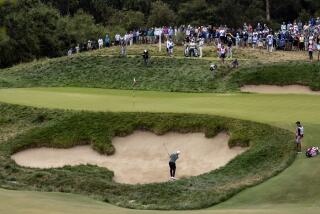Fast Play Comes After the Match
- Share via
CARLSBAD, Calif. — What is the fastest thing on earth? It could be a gazelle, or a jet airplane, or how soon credit card charges show up on your bill. Those are pretty fast, but they’re not even close. The fastest thing on earth is Rich Beem after he loses in the first round of match play.
Dude was a comet. Beem conceded Steve Lowery’s putt at the last hole and then removed his cap. He probably did that to reduce the drag, because right after, he was out of there. Off the green, over the cart path and up the steps.
The pace of Beem’s departure from the course is understandable, due to five bogeys. Lowery even won one hole with a bogey because Beem double-bogeyed it.
Actually, Beem wasn’t the only player who couldn’t leave La Costa fast enough Wednesday at the Accenture Match Play Championship. Take Sergio Garcia. He lost the last five holes to turn a certain victory into a miserable defeat and you could not have made him happy if you told him that his waggle is the best thing to happen in golf since graphite.
There is something about getting bounced out of the first round of a match play tournament that makes players unhappy. First, there’s the money involved. Players who lose in the first round make $30,000, which isn’t bad, but if they somehow managed to last two more rounds, the prize would be all the way up to $95,000.
Also, losing in the first round is terribly inconvenient. Retief Goosen flew all the way here from a tournament in Malaysia and got to play 15 holes. Hopefully, the food was good on the airplane.
Maybe the real problem with this match play is what everybody has said all along: It is so different than a regular, 72-hole, stroke-play tournament. In a normal tournament, you’re playing against the course and if you don’t win, then neither did 142 other players.
It’s much easier to take because it’s more familiar territory and you can kick the rationalizing into high gear. It just wasn’t your day. It was the course’s fault.
In match play, you are beaten by another player, simple as that. It’s only 18 holes, or less, and that’s not very many.
Another example of unhappiness was put on display by Colin Montgomerie. If it wasn’t bad enough that he lost his match, then he was forced to endure being asked to explain why. Let’s just say he was not thrilled with the task.
In fact, Montgomerie found it so unpleasant, he made it quite clear that he would rather spend a few minutes dropping bricks on his feet instead of talking about spraying a golf ball all over the place.
At least Montgomerie talked, though, which is something David Duval didn’t do.
Several minutes earlier, Duval three-putted from 40 feet for a bogey when a par would have defeated Justin Rose. And that came right after he had pulled himself back even with birdies at the 16th and 17th.
Duval lost in 20 holes, calmly handed his putter to his caddie and started to walk down the fairway and back to the clubhouse when he saw a handful of reporters coming his way. It was time for action. Duval made a quick about-face, but the reporters saw his move and made one of their own, cutting off his retreat.
When the chase ended and the reporters caught up, Duval said he would not comment. But that little parade, or whatever you want to call it, already had said it all.
Losing stinks, and losing in the first round of a $6-million match play tournament stinks even worse.
There may have been only one player who lost in the first round and didn’t feel like throwing himself into the small lake by the 16th green. That would be Ernie Els, the second-ranked player in the world, who lost to Phil Tataurangi in 20 holes.
Els chuckled when he saw a covey of reporters waiting for him. He pointed at Tataurangi.
“He won,” Els said.
That’s not normal, though. It’s usually easier to pick out the first-round loser. He’s one step behind Beem but picking up ground.
More to Read
Go beyond the scoreboard
Get the latest on L.A.'s teams in the daily Sports Report newsletter.
You may occasionally receive promotional content from the Los Angeles Times.










